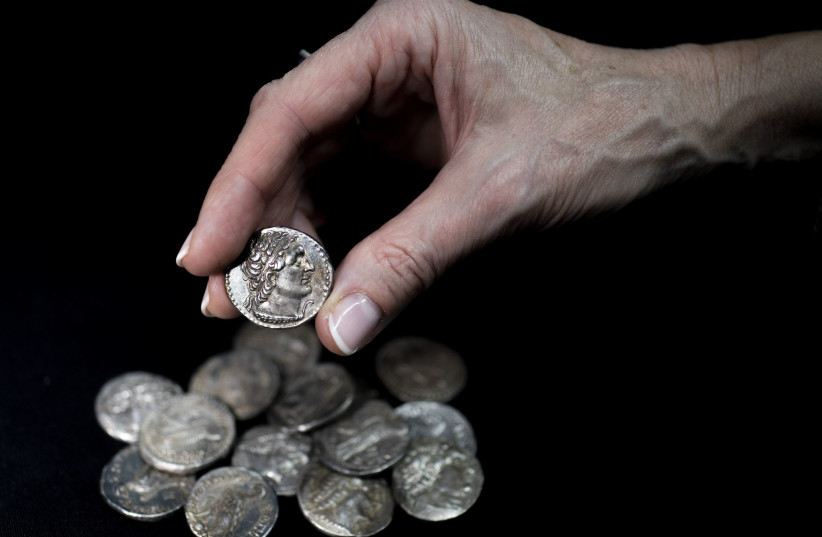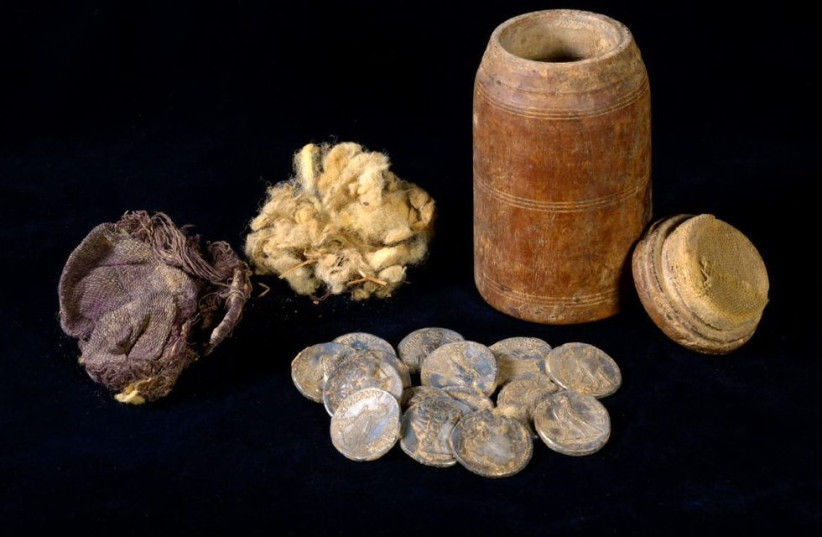by Jerusalem Post Staff
The coins, dating back to the period leading up to the Maccabean revolt, were discovered in the Wadi Muraabat Caves in Nahal Darga.
 |
A wooden box containing 15 silver coins from the Maccabean period
was discovered in the Judean Desert earlier this year, and will be put
on display in the Hasmonean Museum in Modi'in, December 13, 2022.
(photo credit: SHAI HALEVI / ISRAEL ANTIQUITIES AUTHORITY)
|
A wooden box containing 15 silver coins that serve as proof of the Hanukkah story of the Maccabees were found recently during an excavation in the Negev Desert.
The coins will be put on display at the Hasmonean Museum in Modi'in in honor of Israel's heritage week which is set to be marked over the holiday of Hanukkah, which begins on Sunday.
The coins, dating back to the years leading up to the Maccabean revolt around 2,200 years ago, were discovered in the Wadi Muraabat Caves in Nahal Darga in May of this year during an excavation project in the Judean Desert caves.
The excavation was carried out by the Israel Antiquities Authority (IAA) in collaboration with the Jerusalem and Heritage Ministry in March-May 2022. Among the many finds, an ancient wooden box was uncovered inside one of the caves.
Upon opening the box, the team of archaeologists discovered that the top half of the box was filled with loose soil, with small stones pressed into the underside of the rim. Underneath the soil, a large piece of purple woolen cloth covered 15 silver coins, each one protected by a layer of wool.

The IAA reported that the uniform group of silver tetradrachm coins were minted by Ptolemy VI, king of Egypt, who reigned over Egypt at the same time as his uncle - Antiochus IV - reigned over the Seleucid Empire. The three earliest coins in the hoard were minted in 176 BCE, while the later coin in the hoard dates from 171-170 BCE. One of the coins featured a handwritten engraving of the name "Shalmai" in Aramaic script.
In Jewish tradition, Antiochus is the king who the Maccabees fought against during the story of Hanukkah.
A glimpse into life before the Maccabean Revolt
"It is interesting to imagine who the man was who fled and hid his private property there with the intention of returning," says IAA researcher Dr. Eitan Klein of the discovery. "It seems that, due to the events of the time, the man was killed in battle and didn't come back to take his property, and left it waiting for us for 2,200 years."
Stressing the unique nature of the find, Klein added that it is "the first clear archaeological evidence that the caves of the Judean Desert were used as an area of activity for Jewish rebels or refugees in the days before the Maccabean Revolt, or at the start of it."
The Maccabean Revolt was a Jewish rebellion led by the Maccabees against the Seleucid Empire, one of the Greek polities of the ancient Hellenistic world that formed out of the ashes of the Macedonian Empire of Alexander the Great. The revolt itself was sparked by a need to fight the influence the Selucid's Hellenistic lifestyle was having over Jewish life.
Notably, this war started out as a more asymmetrical guerrilla war waged by the smaller Maccabeean forces against the larger Selucid army. However, it would eventually develop into a proper military force fighting the Selucids head-on in battle.
The revolt lasted from 167-160 BCE, which is when the Hasmonean's leader, Judah Maccabee, also known as Judas Maccabeus, was killed at the Battle of Elasa. The war itself, however, continued for several years, ultimately ending in 134 BCE when the Maccabees gained independence, forming the Hasmonean kingdom. This was the first time the Jews established their own self-ruled sovereignty in the Land of Israel since the destruction of the First Temple by the Babylonian Empire years before, and would last until its conquest by the Romans.
The Maccabean Revolt forms the basis of the Jewish holiday of Hannukah, which celebrates the Maccabean victory over the Seleucid Empire. Its story has also been recounted in the first and second Book of Maccabees, which are considered canonical by several mainstream Christian denominations but not by any Jewish groups.
Jerusalem Post Staff
Source: https://www.jpost.com/archaeology/article-724728
No comments:
Post a Comment